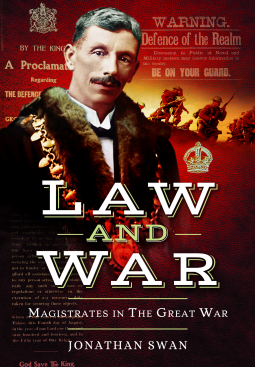 |
Law and War
by Jonathan Swan ISBN-13: 9781473853379 Hardcover: 272 pages Publisher: Pen & Sword Released: March 30, 2017 |
Source: ebook review copy from the publisher through NetGalley.
Book Description, Modified from NetGalley:
Within days of the outbreak of hostilities of the Great War, the English government introduced the Defence of the Realm Act. With several amendments over the years, this all-encompassing legislation resulted in the creation of hundreds of subsidiary regulations, many of which affected the lives of ordinary people in a way they had never expected.
Many, including the magistrates themselves, fell foul of the myriad orders, covering billeting, licensing, lighting and rationing, which were enforced by the new special constables. At the same time, the conscription of the criminal classes saw a huge fall in the normal workload of the courts and the closure of many prisons.
The magistrates responded as best they could. Some magistrates went to war; some lost their lives. Others served in the many voluntary organisations and committees that appeared across the country, such as the Military Service Tribunals or the Volunteer Corps.
The end of the war saw a further change to the old order when the first women magistrates were appointed, marking the birth of modern magistracy.
My Review:
Law and War looked at the many challenges faced by England's magistrates during the Great War as many new laws--often poorly worded or not well thought out--were put into affect. The author explained how things worked before the war and then during the war. He included a detailed overview of how the legal system worked prior to the war, which I found especially useful since I'm not from England.
The author quoted the laws (in part or in full) and described some court cases showing how people accidentally or deliberately broke those laws. He talked about military law and martial law, the Defense of the Realm Act, laws about billeting, enemy aliens, drunkenness and alcohol, lights showing at night, enlistment and exemptions, desertion and absent without leave, food prices and rationing, and laws specifically affecting women and children. He also briefly talked about fraud, special constables, and a few other issues.
I thought the book was going to be more about how the role of magistrate changed because of the war, and he did cover this. However, most of the book looked at the laws that were passed and how they affected people. The information was interesting, so I'd recommend this book to people interested in this aspect of WWI.
If you've read this book, what do you think about it? I'd be honored if you wrote your own opinion of the book in the comments.




No comments:
Post a Comment